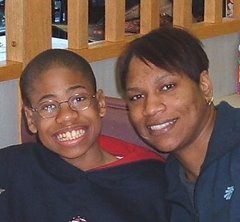Advocates of the Ridge school in Dutchess County, NY are trying to get Regional approval with the state, which means education programs for our children with autism in their own community.
Please sign and forward The Respect and Justice for Ridge School Petition. Our children and loved ones will benefit from this program. You must live in New York State to sign the petition. Thanks!
Thursday, March 26, 2009
Thursday, March 12, 2009
Survey of Feeding and Digestive Problems in Autistic Children
We were asked to share this information with parents to complete A Survey of Feeding and Digestive Problems in Children with Autistic Spectrum Disorders (ASD): Comparison with non-ASD siblings by Richard Schwartz, MD, pediatrician and professor of pediatrics at Virginia Commonwealth University, Inova Fairfax Hospital for Children, Falls Church, VA.
Below is an introductory letter to parents. Please read it before completing the survey. This is done to fulfill a requirement to explain possible risks, benefits, and confidentiality to all survey participants.
Dear Parent:
The purpose of this survey is to study feeding and digestive problems among children with autistic spectrum disorders (ASD) and their siblings. By filling out this survey, you can help pediatricians and other health professionals learn more about this issue. The results of this study will beused to provide better care and counseling to the parents of autistic children.
Completion of the survey should take approximately 23 minutes.
For your reference, we provide answers to some of the common
questions parents ask about this survey.
What will happen if I take part in this research study?
If you agree to participate in this study, please complete the
attached survey. Your participation in this survey is entirely
voluntary. Once you begin this survey, you may end it or cancel
it at any time.
What risks or benefits can I expect from being in the study?
The only foreseeable risk to you is possible loss of confidentiality.
To minimize this risk, we made this survey anonymous and confidential.
This means that your name will not linked to the completed questionnaire,
and your individual responses will not be published or shared with any
party. For more information, please refer to the next question.
The potential benefit to you is that we can send you a copy of the
research results, if you are interested.
Will my medical information be kept private?
Efforts have been made to protect your identity. No identifying code
has been placed on the survey form nd no one outside of the research
team will have access to the individual completed surveys. Only group
data will be reported and responses will not be person-identifiable.
Efforts have been made to protect your identity. No identifying code
has been placed on the survey form and no one outside of the research
team will have acce Efforts have been made to protect your identity.
No identifying code has been placed on the survey form and no one outside
of the research team will have access to the individual completed surveys.
What other choices do I have if I do not take part in this study?
Taking part in this research study is voluntary. If you choose not to
participate, there will be no penalty or loss of benefits to which you
are otherwise entitled.
Who can answer my questions about the study?
If you have any questions regarding this research study, please
contact Vahe Badalyan, MD, at vbadalyan@aol.com.
Thank you for participating in this survey.
If you have any questions or concerns, please do not hesitate to
contact me at vbadalyan@aol.com.
Thank you for your time.
Below is an introductory letter to parents. Please read it before completing the survey. This is done to fulfill a requirement to explain possible risks, benefits, and confidentiality to all survey participants.
Dear Parent:
The purpose of this survey is to study feeding and digestive problems among children with autistic spectrum disorders (ASD) and their siblings. By filling out this survey, you can help pediatricians and other health professionals learn more about this issue. The results of this study will beused to provide better care and counseling to the parents of autistic children.
Completion of the survey should take approximately 23 minutes.
For your reference, we provide answers to some of the common
questions parents ask about this survey.
What will happen if I take part in this research study?
If you agree to participate in this study, please complete the
attached survey. Your participation in this survey is entirely
voluntary. Once you begin this survey, you may end it or cancel
it at any time.
What risks or benefits can I expect from being in the study?
The only foreseeable risk to you is possible loss of confidentiality.
To minimize this risk, we made this survey anonymous and confidential.
This means that your name will not linked to the completed questionnaire,
and your individual responses will not be published or shared with any
party. For more information, please refer to the next question.
The potential benefit to you is that we can send you a copy of the
research results, if you are interested.
Will my medical information be kept private?
Efforts have been made to protect your identity. No identifying code
has been placed on the survey form nd no one outside of the research
team will have access to the individual completed surveys. Only group
data will be reported and responses will not be person-identifiable.
Efforts have been made to protect your identity. No identifying code
has been placed on the survey form and no one outside of the research
team will have acce Efforts have been made to protect your identity.
No identifying code has been placed on the survey form and no one outside
of the research team will have access to the individual completed surveys.
What other choices do I have if I do not take part in this study?
Taking part in this research study is voluntary. If you choose not to
participate, there will be no penalty or loss of benefits to which you
are otherwise entitled.
Who can answer my questions about the study?
If you have any questions regarding this research study, please
contact Vahe Badalyan, MD, at vbadalyan@aol.com.
Thank you for participating in this survey.
If you have any questions or concerns, please do not hesitate to
contact me at vbadalyan@aol.com.
Thank you for your time.
Thursday, March 05, 2009
Some Behavior Problems May Be Reduced By Supportive Co-Parenting
Article Date: 04 Mar 2009
Researchers looked at changes in children's level of aggressive behavior and other forms of "acting out" as they went from 4 years old to 5 years old. The study found that supportive co-parenting helped children who have difficulty regulating their behavior and attention levels - what researchers call effortful control. Results showed children who had low levels of effortful control generally showed increases in negative behaviors over the year - unless their parents had a supportive co-parenting relationship.
"If you support your spouse in front of your child, show that you are a united front, it can help prevent some behavior problems in children who may be at risk," said Sarah Schoppe-Sullivan, lead author of the study.
"If you have a child who has trouble controlling his or her behavior, that's not a problem that often goes away," she said. "That's one reason why it is so significant that positive co-parenting can help manage the problem."
Read full article at: http://www.medicalnewstoday.com/articles/141093.php
For practical ways to help, plan and manage autism visit: Child-Autism-Parent-Cafe.Com.
Researchers looked at changes in children's level of aggressive behavior and other forms of "acting out" as they went from 4 years old to 5 years old. The study found that supportive co-parenting helped children who have difficulty regulating their behavior and attention levels - what researchers call effortful control. Results showed children who had low levels of effortful control generally showed increases in negative behaviors over the year - unless their parents had a supportive co-parenting relationship.
"If you support your spouse in front of your child, show that you are a united front, it can help prevent some behavior problems in children who may be at risk," said Sarah Schoppe-Sullivan, lead author of the study.
"If you have a child who has trouble controlling his or her behavior, that's not a problem that often goes away," she said. "That's one reason why it is so significant that positive co-parenting can help manage the problem."
Read full article at: http://www.medicalnewstoday.com/articles/141093.php
For practical ways to help, plan and manage autism visit: Child-Autism-Parent-Cafe.Com.
Subscribe to:
Comments (Atom)


